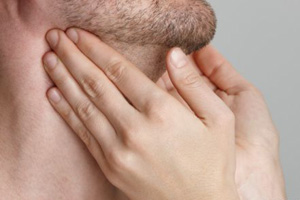Is it Your Thyroid?
As told by Marina Monsisvais

An enlarged thyroid can be felt with bare hands.
When undiagnosed and untreated, thyroid problems can cause a variety of uncomfortable symptoms including weight gain or inability to lose weight, depression, anxiety, fatigue, infertility and other troublesome issues. Because symptoms are broad, thyroid disease is often misdiagnosed as a mental health issue, attributing symptoms to lifestyle factors like lack of sleep, overeating or stress.
“Thyroid issues are mostly genetic and thyroid problems do run in the family,” said Zinnia T. San Juan, M.D., with the Paul L. Foster School of Medicine Department of Internal Medicine’s Division of Endocrinology. “They are more common in young women, but can happen at any age including in the elderly, depending on the specific type of thyroid problem.”
San Juan said iodine deficiency, exposure to goitrogens — foods and substances that can cause goiter — and other environmental factors may also play a part in thyroid disease.
The thyroid gland is a small butterfly-shaped gland located in the neck. When the thyroid is its normal size, you can’t feel it with bare hands. When it works normally, it produces the amount of T4 and T3 hormones necessary to keep things moving at their proper pace.
The thyroid gland controls how quickly the body uses energy, makes proteins and controls how sensitive the body is to other hormones. It does this by producing T4 and T3 thyroid hormones. These hormones act throughout the body to influence metabolism, growth and development as well as body temperature. During infancy and childhood, adequate thyroid hormone is crucial for brain development.
“Thyroid health is important especially for women of who are child-bearing age or are pregnant, as this affects fetal development and pregnancy outcome,” San Juan said. “Thyroid disease is an otherwise easily treated problem.”
The most common thyroid problems are over activity, known as hyperthyroidism, and under activity, or hypothyroidism.
“Of the two, hypothyroidism is more common,” San Juan said. “In the U.S., the most common cause of hypothyroidism is an autoimmune disease called Hashimoto’s thyroiditis where your own body makes antibodies that attack the thyroid cells.”
Hashimoto’s thyroiditis can’t be prevented, but is easily treated with replacement thyroid hormone pills, San Juan said. Iodine deficiency as a cause for hypothyroidism is more common outside the U.S. and can be prevented by adequate intake of iodine in the diet.
San Juan said while there is no consensus from either the U.S. Preventive Service Task Force or the Endocrine Society on whether to check for thyroid issues during annual physical exams, patients who suspect thyroid dysfunction can be diagnosed with a simple blood test.
Related
Find Balance Through Ancient Healing Techniques
Related Stories
Celebrating Veterans: TTUHSC’s General Martin Clay’s Legacy of Service and Leadership
From his initial enlistment in the Army National Guard 36 years ago to his leadership in military and civilian health care management roles, Major General Martin Clay’s career has been shaped by adaptability, mission focus and service to others.
Texas Tech University Health Sciences Center School of Nursing Named Best Accelerated Bachelor of Science in Nursing Program in Texas
The TTUHSC School of Nursing Accelerated Bachelor of Science in Nursing (BSN) program has been ranked the No. 1 accelerated nursing program in Texas by RegisteredNursing.org.
TTUHSC Names New Regional Dean for the School of Nursing
Louise Rice, DNP, RN, has been named regional dean of the TTUHSC School of Nursing on the Amarillo campus.
Recent Stories
The John Wayne Cancer Foundation Surgical Oncology Fellowship Program at Texas Tech University Health Sciences Center Announced
TTUHSC is collaborating with the John Wayne Cancer Foundation and has established the Big Cure Endowment, which supports the university’s efforts to reduce cancer incidence and increase survivability of people in rural and underserved areas.
TTUHSC Receives $1 Million Gift from Amarillo National Bank to Expand and Enhance Pediatric Care in the Panhandle
TTUHSC School of Medicine leaders accepted a $1 million philanthropic gift from Amarillo National Bank on Tuesday (Feb. 10), marking a transformational investment in pediatric care for the Texas Panhandle.
Texas Tech University Health Sciences Center Permian Basin Announces Pediatric Residency Program Gift
TTUHSC Permian Basin, along with the Permian Strategic Partnership and the Scharbauer Foundation, Feb. 5 announced a gift that will fund a new pediatric residency.
